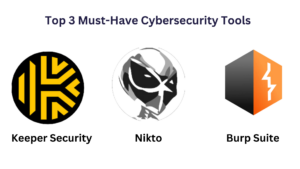Introduction
More than ever, having the appropriate cyber security tools is essential. We must protect our information because there are so many risks on the internet. These tools aid in safeguarding our general privacy, company information, and personal data. You wouldn’t want to expose all of your credit information on your email to a hacker, after all.
By utilising phishing attempts, that is achievable. Additionally, you wouldn’t want someone to be able to access your social media accounts and upload your photos for public viewing! This holds true for businesses as well. More sensitive information needs to be protected than just pictures from social media!
Due to their ability to handle a company’s security, these cyber security technologies are growing in popularity. They can determine whether the network has any weaknesses, such as default passwords, or whether any files or folders seem strange or might be infected with malware.
They also scan all network protocols, including IP, TCP, UDP, and others, and look for attempts at phishing in emails. Cyber security technologies not only identify vulnerabilities but also offer recommendations on how to fix them. These cyber security tools can guarantee that no one can breach your company’s network and that your data is safe on the internet.
What is Cyber Security
The practice of safeguarding networks, systems, and data against unauthorized use, disclosure, disruption, alteration, or destruction is known as cyber security. It includes a broad range of methods and approaches to guarantee the privacy, availability, and integrity of your digital assets.
Below is a summary of the main elements of cyber security:

- Confidentiality: Preserving information secret and limiting access to those who need to know is known as confidentiality.
- Integrity: ensuring that data is accurate and isn’t improperly altered.
- Availability: Ensuring that the appropriate individuals have prompt, dependable access to information and systems when needed.
Most Popular Cyber Security Categories
These are a few of the most popular categories of cyber security instruments:
- Antivirus software: Examines and eliminates malicious software from your system.
- Firewalls: Using security rules, they keep an eye on and regulate all incoming and outgoing network traffic.
- Intrusion Detection Systems (IDS): Finds possible threats and questionable activities on a network.
- Systems for preventing intrusions (IPS): identify and stop possible threats before they have a chance to cause damage.
- Encryption Tools: Data is safeguarded by encryption tools, which transform it into a secure format that only authorized users may access.
- Password managers: They assist you in creating and keeping secure, one-of-a-kind passwords for many accounts.
- Vulnerability Scanners: Find holes in your system that an attacker could use to get access.
- Tools for Network Security Monitoring: Constantly scans network traffic for anomalous or questionable activity.
Top 3 Cyber Security Tools
Now let’s examine the Top 10 Cyber security Tools of 2024. While some of these tools are freely available and open source, others are offered by businesses as part of a monthly membership cost. After viewing them, you can select the one that best suits your needs or the needs of your business. Now let’s get going!
1. Keeper Security
One of the top cyber security firms, Keeper Security is renowned for its sophisticated password management. Your passwords and logins are always encrypted since it use end-to-end encryption. This makes sure that your text-based data copies are secure from prying eyes. Furthermore, in order to protect your information, multi-factor authentication (MFA) necessitates a biometric login or physical token.
Important Elements of Security Keepers
- Password management: To improve security, Keeper’s encrypted vault generates strong, one-of-a-kind passwords and keeps all of your passwords in one safe place.
- Zero-Knowledge Security Architecture: Encrypted data is only accessible by the user. To ensure the highest level of security and privacy, the Keeper is unable to read or decode user data.
- Multi-Platform Compatibility: Desktops, tablets, and smartphones can all readily access Keeper Security.
- Enterprise Solutions: It provides IT administrators with centralized control to monitor and implement security policies.
2. Nikto
An open-source vulnerability scanner called Nikto examines web servers to make sure that no harmful materials, such as viruses or corrupted files or directories, are present. Additionally, it looks for any out-of-date server components and detects any cookies it has received, handling them properly. Nikto is a highly quick scanner, but because it doesn’t try to blend it, log files will show it. Another benefit is that you may store all of the final reports that Nikto generates in easy formats, such as HTML, CSV, XML, or plain text.
Important Elements of Nikto
- Extensive Scanning: Nikto is capable of searching over 6,700 potentially hazardous files and programs on web servers.
- Server Detection: It can determine the versions and modules of the software that is operating on web servers.
- Outdated Software: Nikto searches over 1,250 web servers and software packages for out-of-date versions.
- Vulnerability Identification: It finds typical vulnerabilities such as SQL injection and cross-site scripting (XSS).
- SSL Support: Nikto is able to verify the security of servers that use SSL (HTTPS).
3. Burp Suite
Burp Suite is a web vulnerability scanner that can search your network for various vulnerabilities, including password submission in cleartext, OS command injection, and SQL injection. A web application crawler included in Burp Suite is also capable of analysing applications and reporting on their volatile content. Every vulnerability that Burp Scanner discovers comes with advice on how to fix it, making the network safe. In addition to the expensive Enterprise and Professional editions, Burp Suite is also offered as a free community edition.
Important Elements of Burp Suite
- Web Vulnerability Scanner: This tool looks for security flaws in websites automatically.
- Proxy Server: Monitors and records all online activity going through your browser to the internet.
- Intruder Tool: Automated attacks are carried out by the Intruder Tool to check for vulnerabilities.
- Repeater Tool: This tool repeatedly sends tailored requests to observe the web application’s response.
- Spider Tool: Explores webpages to map all of the pages and functionalities.
Conclusion
The most well-liked and best cyber security tools are some of them. You can examine them and determine which ones best fit your requirements. Since the majority of data is stored online and there is a significant risk of hacking, cyber security is crucial these days. For more information related to cyber security courses online, cyber security certifications, cyber security online training, and cyber security learning, then kindly visit our website blog page and enhance your knowledge about cyber security.






No comment yet, add your voice below!